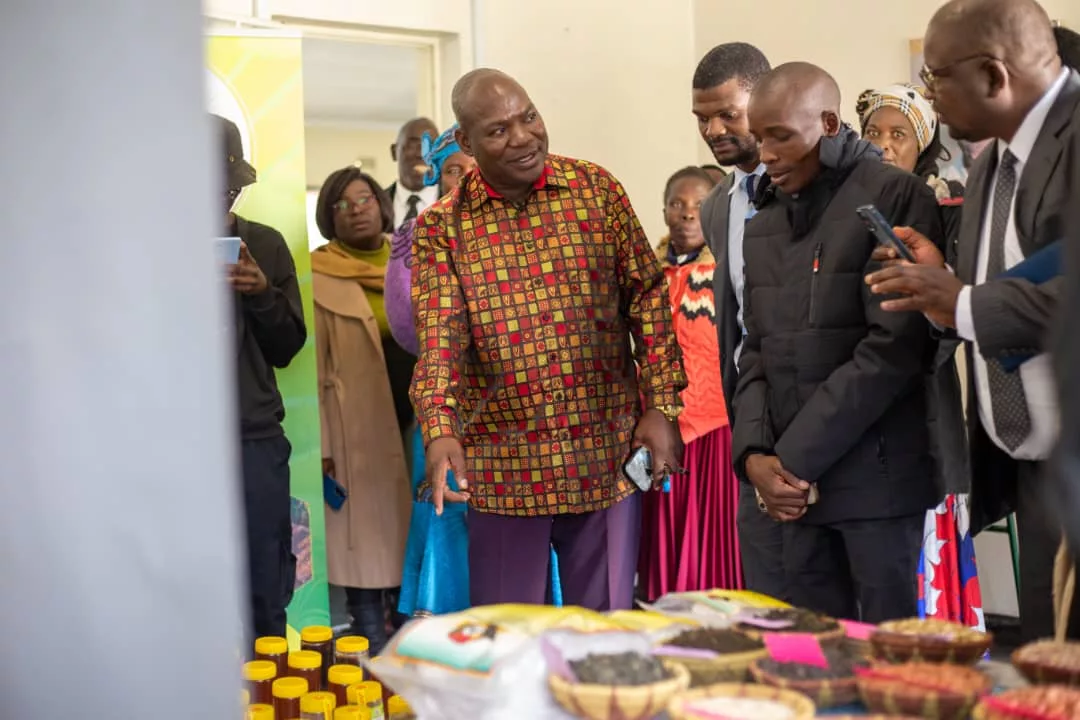
First published by spiked online media on July 12, 2024
In partnership with Parliamentarians, the Zimbabwe Smallholder Organic Farmers Forum (ZIMSOFF) is fighting gender-based violence (GBV) and drug and substance abuse in communities by implementing various agroecology mechanisms.
Speaking at a tour of their projects by the Parliamentary Portfolio Committees (PPC) on Lands at the National Policy Dialogue recently, a Gutu small livestock farmer, Daizy Mandaza (42) highlighted that agroecology flocks freedom, herds hope, breaking the shackles of GBV.
“Women and youth are being looked down upon because whatever is in the yard is said to belong to the men. Keeping small livestock like fish, goats and sheep, turkeys, road runner chickens, and rabbits empowers us and removes the dependency on males, avoiding GBV, “ she said.
Mandaza highlighted that even what other farmers might deem as waste, in agroecology, is wealth.
Agroecology is a holistic approach to agriculture that seeks to optimize the interactions between plants, animals, humans, and the environment while also addressing the need for socially equitable food systems.
“We use chicken droppings, earthworms, and other leftovers from the kitchen to feed our fish. We pay school fees with the proceeds of selling fish at the same time eating healthy,” she said.
With agroecology, Mandaza provides for her family on a shoestring budget.
“We feed the rabbits with weeds but get meat and money in return, and the urine is good fertilizer. We also get manure from turkeys, and we use it as a natural incubator for chickens. We can incubate 30 eggs at a time and place another 30 every 21 days, and the feathers are used to make feather dusters,” she said, to the amusement of the visitors.
For 44-year-old Janet Mutanda, her kitchen has become a sanctuary, where food processing has given her the tools to take control of her life and keep GBV at bay.
Residing in the mountainous Chimanimani, Mutanda processes the baobab fruit and honey to make various products to earn a living.
“The baobab fruit shell gives us soda, while the powder makes healthy porridge, and the seed makes powder, which is good for blood pressure (BP). The seed also gives us oil good for hair and skin,” she said.
Mutanda keeps bees by herself, and from the hives, she yields various products, sweetening her family’s life.
“We pack pure honey in 375ml bottles with each going for US$3. From the other residues, we make shoe polish, and wax, and we can feed our livestock from that too,” she said.
From a 20L bucket of honey, Mutanda gets 45 375ml bottles and sustains her family.
Peter Mudzingwa, a young farmer from Shashe in Masvingo, said that despite agroecology providing a healthy life for farmers, it is also an antidote to drug abuse, cultivating a healthy and productive youth.
He also reiterated that despite being a farmers’ forum, ZIMSOFF also helps prevent GBV as 70% of the food being consumed in the country is from smallholder farmers, 60% of which is produced by women.
Hence, protecting the woman from GBV is securing food for the nation.
“As farmers, we are not only producing food but also campaigning against GBV. On the other hand, drug abuse is a national disaster destroying our youths. As ZIMSOFF youths, we saw it fit to implement projects that can keep us occupied to make sure we never think of using drugs,” he said.
“Staying in the field fills lungs with clean air, not drug vapours harmful to the youths,” he added.
In response, a member of the Parliamentary Portfolio Committee on Lands, Honourable Felix Soul Maburutse, highlighted that it takes a community to raise a child, so it is upon the shoulders of everyone to create a drug-free country.
“It is our responsibility as a country to make sure that the youths do not indulge in drug and substance use,” he said.
ZIMSOFF Chairperson, Delma Ndlovu, reiterated that such engagements with parliamentarians are important as both parties have to know what each is doing in respect of the other.
“This meeting is a stepping stone to the future. We want to try to bring this meeting to fruition, and we will try to bring to them the issues that they are expecting from us and explain to them,” he said.
In Zimbabwe, one in three women aged 15 to 49 has experienced physical violence, and 40% of the same age group has experienced physical and/or sexual violence by an intimate partner according to the United Nations Population Fund (UNFPA). However, there are no official statistics on drug use in the country.
Addressing legislators at a workshop on enhancing food security on the African continent held in Ghana recently, Ms Panduleni Elago, the Comprehensive Africa Agriculture Development Programme (CAADP) Senior Advisor, said Members of Parliament have a role in agri-food transformation, especially through encouraging a 10% annual budget allocation to be earmarked strictly to agricultural development by all the 55 African Union member states, individually.
